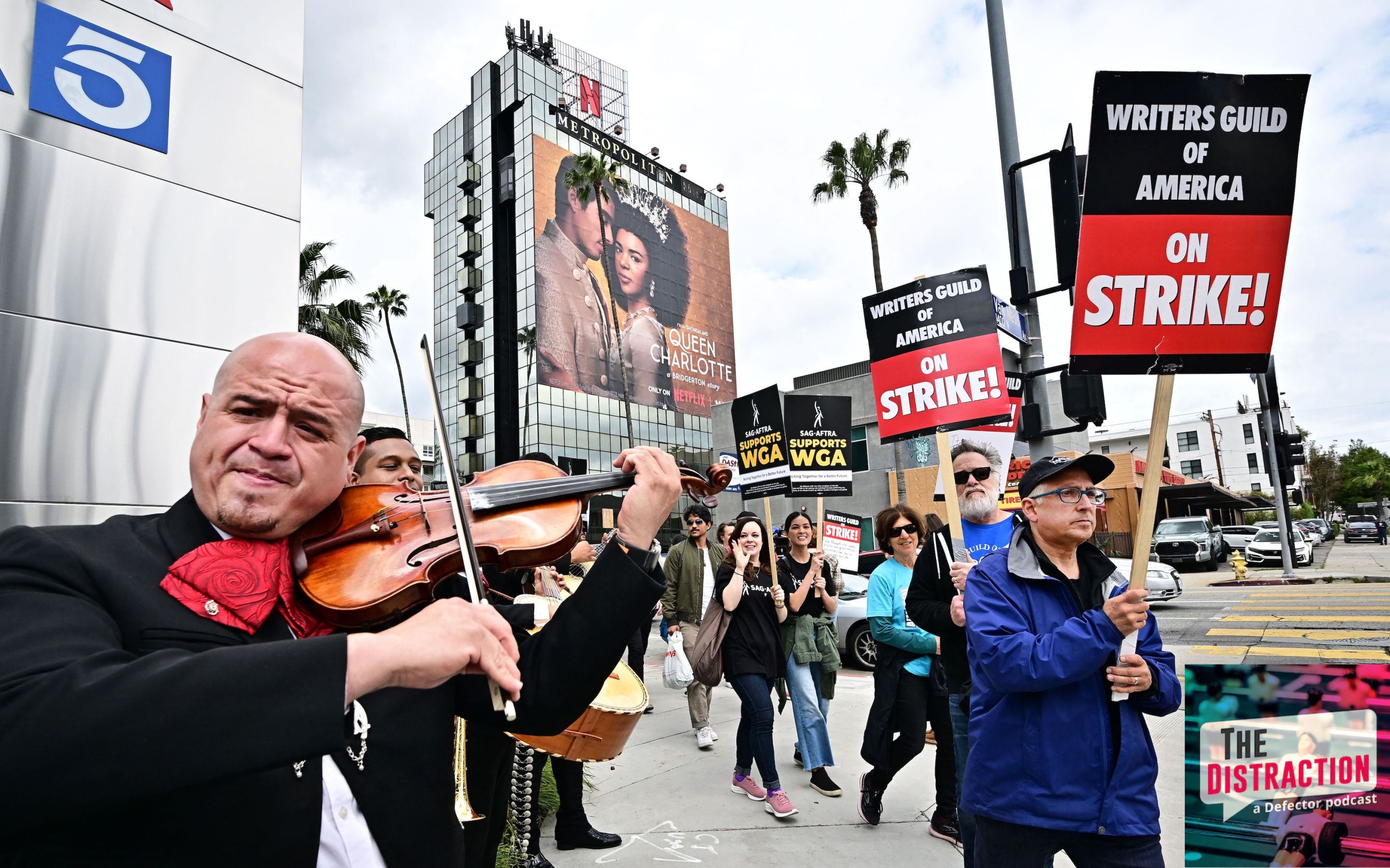Everywhere, every day, in every way imaginable and a great many beyond that, people that own things are devising new ways to fuck over the people that make things. That strikingly elegant sentence is not the first time that observation has been made; it is, by now, something like the basic condition of everyday life for more or less every working person on earth. Some have it worse than others, and the effects differ by degree and according to context, but the dynamic is what it is and the reality of it is hard not to know. There are people who don't want to know it, or misunderstand which end of that binary they occupy, but this relationship cannot help but make itself felt. This is made more urgent, or just more obvious, by the fact that bosses increasingly seem to see it as their prerogative to stunt on what they see as their enemies, which in this case is "everyone they might ever have to pay."
To make this less abstract and more specific, the Writers Guild Of America went on strike last week. The WGA is one of Hollywood's many powerful unions, and like all the others represents a labor force that's both absolutely fundamental to the continued existence of one of the most profitable businesses in the history of capitalism and one that the industry's bosses deem to be too expensive. That's not really new, either, but there is something novel and even existential about the stakes in this latest reboot, for both sides. The studios and their corporate parents see an opportunity to make the product they sell cheaper, if probably also worse; the people who make a living creating that product see this as both an attempt to degrade that work and to make their jobs more contingent and onerous and generally worse. Outside every studio in Los Angeles and New York and anywhere else this work gets done, there are now picket lines. The people marching value the collaborative labor that goes into making that valuable stuff in one way; they are the people who actually do that work. In the offices, on the other side of those lines, are people who value it differently and very much less. You can see the problem.
And it was with that in mind that we had returning champion Adam Conover, a prolific television host and comic and podcaster who is a member of the WGA's negotiating team and a delightful guy on top of all that, back on the podcast this week. Adam's voice was decently blown-out after a week on the picket lines; Drew's audio is half-borked because his microphone connection was screwed up; my performance, as the guy who restates some obvious premises and sometimes interrupts other people making more interesting points, was pretty much par for the course. But the episode itself, in my admittedly biased opinion, is still "a good one."
It's a moderately heavy/dense one as well, dealing as it does with both recent labor history and a current conflict that really does feel existential in its implications. We talked about the last WGA strike, which spanned 100 days between 2007 and 2008 and ended much less righteously than it began thanks to some crucial factional and sectoral defections—Drew read up on this, and Adam, as a certified labor nerd, offered some illuminating perspective on that conflict and this one. (I would like to give special recognition to the shockingly wack and shortsighted contribution that Matt Parker and Trey Stone make in this bit.) We also discussed some of the more contemporary challenges that this strike is aimed at both remedying and anticipating, and did our best to tie this struggle into the broader avant-garde/apocalyptic stage of capitalism that prevails at this moment. I believe this is the first time I've spoken the name "Jim Spanfeller" aloud on the podcast, although I guess I alluded to it during our previous conversation about all this with Conover's fellow WGA committee-member Michael Schur not that long ago. But if I'm saying that accursed name out loud, you know things have Gotten Real.
Or, maybe more accurately, some longstanding and never-quite-resolved conflicts are at long last coming to a head. Bosses will do what bosses will do, everywhere and every time there is an opportunity to do it; they are proving, in this conflict and elsewhere, that they will do this even when it puts the very existence of the business at risk. Beyond the fact that Drew and I and presumably some percentage of you all enjoy watching movies and television, this particular gambit by capital, and this particular battle being fought by labor, feels momentous, and not just because it might mess with the Fall network TV schedule. It feels not just like an attempt to bust some of the oldest and strongest unions in the country—and, in the months to come, perhaps those of some other big Hollywood unions—more or less on sheer shitty principle, but like a microcosm of every other offensive by capital against basically everything else. Again, it's not a new conflict, despite the new fronts on which it is being fought. It's the fight of all of our lives, increasingly, and the ways in which it differs from one case to another pale in comparison to the ways in which it is all, always, fundamentally the same.
Also we remembered Jeff Reardon a little bit at the end of the episode. Just wanted to get that on the record as well.
If you would like to subscribe to The Distraction, you can do that at Apple Podcasts, Spotify, Stitcher, or wherever else you might get your podcasts. Feel free to discuss this week's episode in the comments below. Thank you as always for your support.






